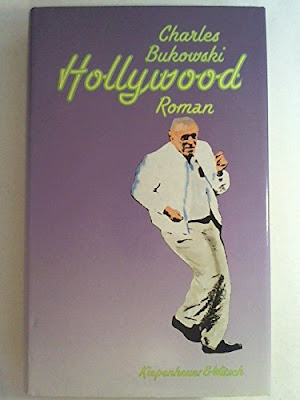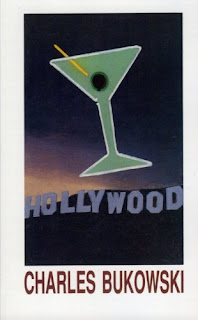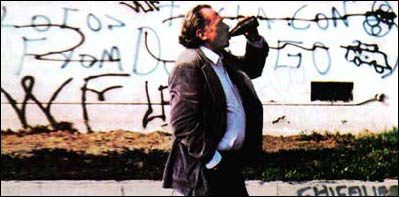The
only notion that's stayed with me from initially
reading Norman Mailer's
extensive report on the
Apollo 11 lunar mission is a vague recollection of Mailer lamenting
that something so unique to human experience as viewing Earth from
afar should be communicated to us not by mission-absorbed engineers
but by poets. I've forgotten if he mentioned a particular poet he
thought appropriate to accompany Armstrong and Aldrin on the flight,
but I sensed an uncharacteristic wistfulness in his tone that he,
Mailer, calling himself "Aquarius," would have liked to be
the one.
I
remembered this anew while reading Hollywood,
Charles Bukowski's novel based on the making of Barfly,
a darkly comic movie
depicting two days in his life as a drunken young poet. Many
of the novel's characters are easily recognizable behind their
fig-leaf pseudonyms. One of them is Victor Norman, "perhaps the
best known novelist in America. He appeared on tv constantly. He was
glib and deft with the word. What I liked best about him was that he
had no fear of the Feminists. He was one of the last defenders of
maleness and balls in the U.S. That took guts. I wasn’t always
pleased with his literary output but I wasn’t always pleased with
mine either."
When they meet, Bukowski's
alter ego, pseudonymed Charles Chinaski, tells us “I liked his
eyes. He looked calm and knowing...I shook hands with him, said, ‘The
barfly meets the champ.’ He liked that.” Later they’re driving
to a party in Chinaski’s black BMW. “‘I’ve got a black BMW
too,’ said Victor Norman. ‘Tough guys drive black BMW’s,’ I
said.” Some literary conversation between these two macho writers
at the party:
Victor looked at me. “You
doing anything now?”
“Fucking with the poem.”
Victor looked a touch sad.
“They gave me a million dollars to write my next novel. That was a
year ago. I haven’t written a page and the money’s gone.”
“Jesus.”
“Jesus won’t help.”
“I’ve heard about your
alimony, all those x-wives…”
“Yeah.”
It was when Chinaski mentions
noticing Victor Norman staring at him curiously that my vague memory
from “Of A Fire on the Moon” came to mind. Here was the wistful
macho man who could write about the giant leap for mankind
only via his imagination, seated across from the macho poet who wrote
the screenplay for a movie about a piece of his own life.
Sure, to us the notion is
ludicrous, and it might well not have been anywhere near the minds of
either Bukowski or Mailer, but if it had… No they did not fight.
After a trip to the men’s room, Chinaski tells us, his wife “leaned
over and whispered, ‘Victor Norman came over while you were gone.
He says that it’s very nice of you that you haven’t said anything
about his writing.’ […] I looked over at Victor Norman, got his
attention. I gave a little nod, winked.”
Whew, major literary macho
puncho averted. How much of it is true is hard to say for sure. I
know some of it is, which is why I lifted the pseudonym fig leaves
above to introduce the scene. Because the publisher has pronounced
Hollywood a work of fiction its author has some leeway with
the narrative and characterizations. Some exaggeration is to be
expected. Most of the characters would have been unknown to me even
if Bukowski had used their real names. One I recognized instantly
without any name: “I saw the famous actor with the
perpetual tan. I’d heard that he went to almost every Hollywood
party, everywhere.”
The
pseudonym for this one wasn’t really needed:
“It was Jim Serry, the old drug guru of the 60’ s. He too went to
many of the parties. He looked tired, sad, drained. I felt sorry for
him. He went from table to table. Then he was at ours. Sarah
[Bukowski’s wife, Linda
Lee Beighle]
gave a delighted laugh. She was a child of the 60’ s. I shook hands
with him. ‘Hi, baby,’ I said.”
Bukowski
captures the craziness and unpredictability of the film industry with
a feel of authenticity, yet there are
times it
seems he
pushes
the envelope a tad too
far,
even for Hollywood. One of them is
a stunt Chinaski’s
director
pulls
with a wheeler-dealer
producer who has cut off financing for the project. The director,
whom Bukowski calls Jon Pinchot, threatens to cut off one of his
own fingers if the producer won’t honor his company’s contract.
Pinchot buys an electric saw, takes it to the producer’s office,
plugs it in, turns it on, and places his pinky on the desk.. The
producer caves. I laughed, but thought, Oh hell, Bukowski wrote this
scene after too many bottles of wine. But I checked it out.
I
knew where to check because in one scene Chinaski and his wife meet
“Rick Talbot” at a restaurant. We quickly catch on that Talbot is
Roger Ebert. They hit it off. Talbot is fascinated by the project.
Soooo, I Googled Ebert’s review of Barfly.
He
liked it. Called it one of the year’s best films. Here’s what he
said about the finger incident:
“Barfly
was directed by Barbet
Schroeder
who commissioned the original screenplay by Bukowski and then spent
eight years trying to get it made. (At one point, he threatened to
cut off his fingers if Cannon Group president Menahem
Golan
did not finance it; the outcome of the story can be deduced by the
fact that this is a Cannon release.)”
I haven’t seen Barfly,
which stars Mickey Rourke and Faye Dunaway, with a cameo of Bukowski
seated at a bar with them, but I gladly give the book, Hollywood,
two thumbs up.




This sounds interesting, I will have to give it a try. Although, if there are earlier books featuring the character, I might start there?
ReplyDeleteHe wrote a slew of books, Tracy, most of them poetry collections, but a few other novels, too. I haven't read anything else by him except The Last Night of the Earth, a collection of poems that came out a couple of years after this novel. He's an acquired taste for many, as his stuff tends to be rather gritty and dark. When I was substitute teaching a high school honors literature class a couple of years ago I found the students bored to tears working on an analysis of Wallace Stevens's poetry, pretty dry stuff I've never much taken to. I looked up Bukowski on the teacher's computer and read them one of his poems. Snapped them out of their torpor. Several students even asked me how to spell his name. Definitely livelier than Wallace Stevens!
Delete